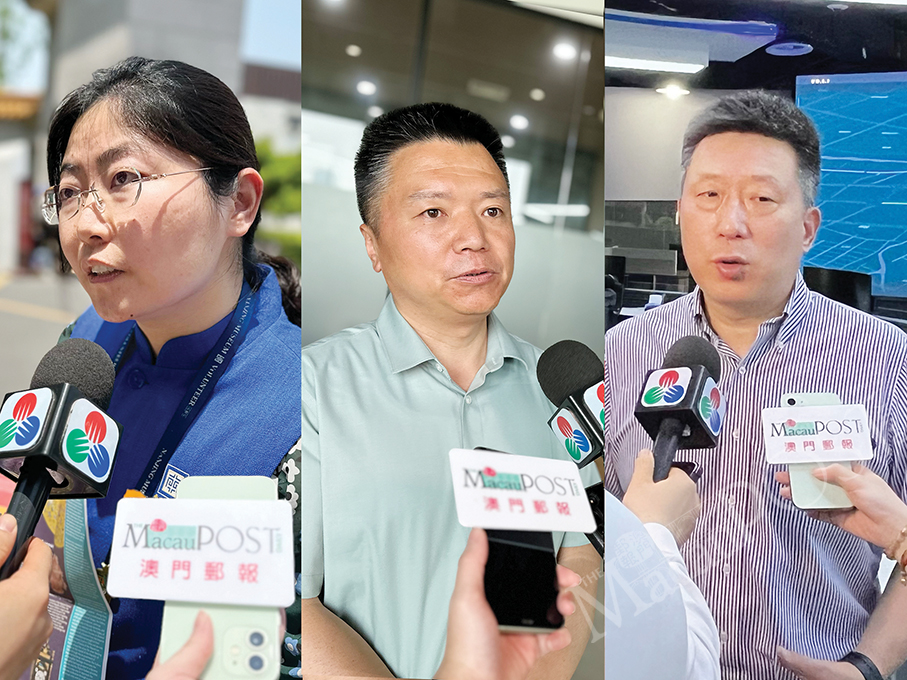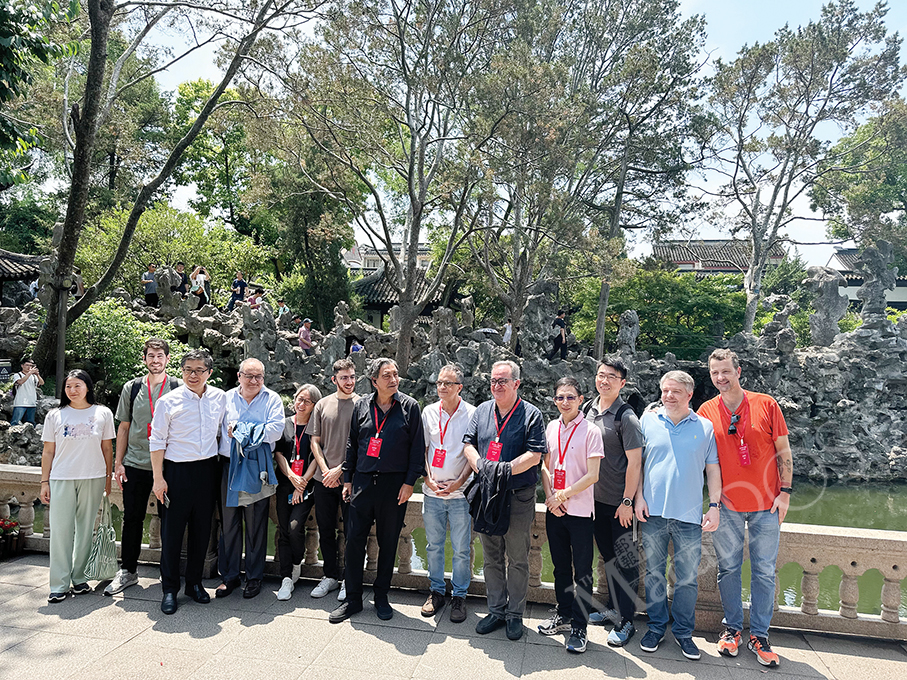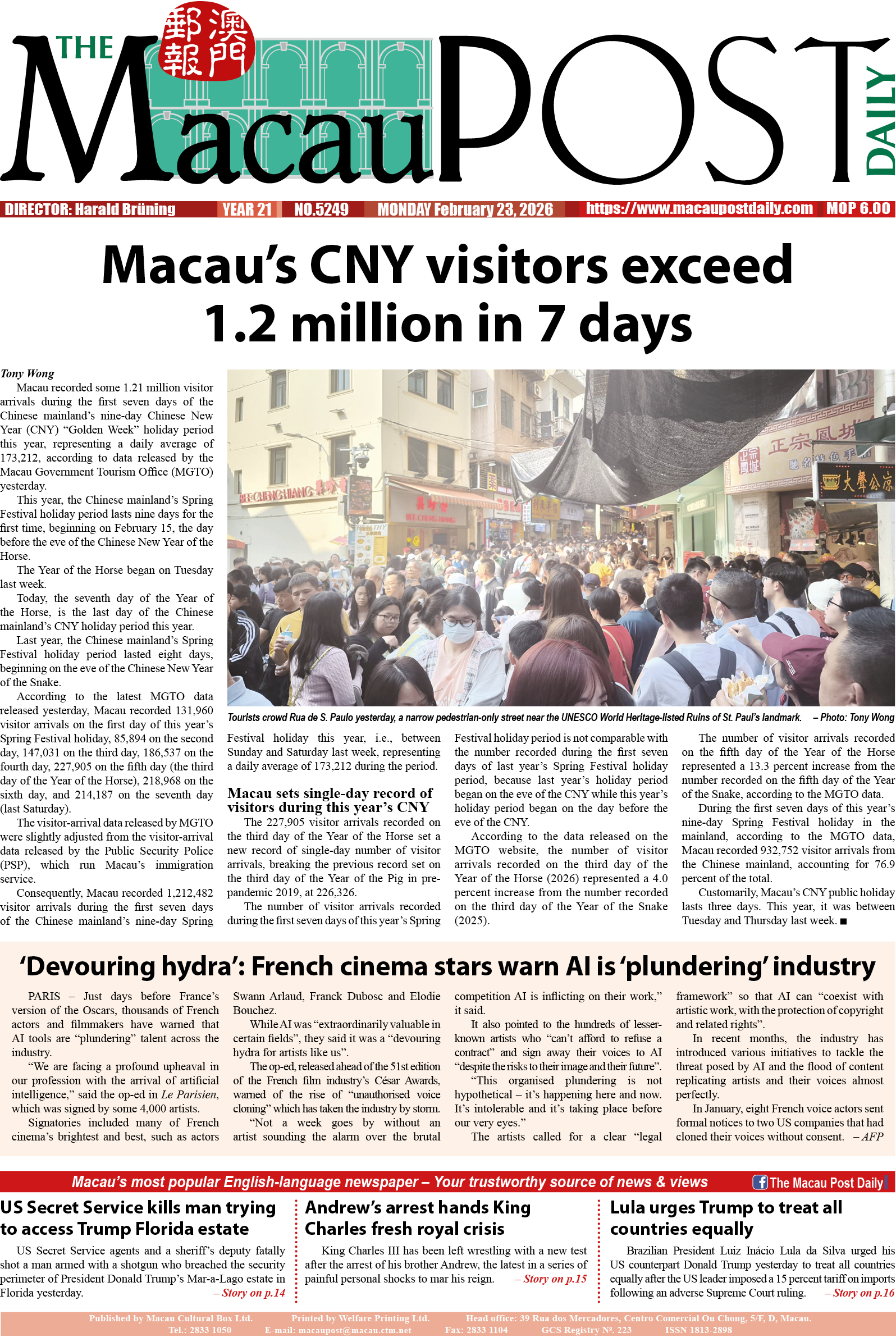Jiangsu province, its capital Nanjing in particular, known as the ancient capital of the Six Dynasties, is generally regarded as a place with a deep historical and cultural heritage, but thanks to the development pace of the new era, Nanjing, and also Wuxi city, combined with their own cultural resources and the advantages of technological development, continue to integrate the protection and utilisation of their rich historical and cultural heritage into the restructuring of their flourishing industry, such as Nanjing’s Qinhuai Silicon Alley and Wuxi’s Internet of Vehicles Pilot Zone, thereby promoting the innovative development of the cultural industry.
Technology enriches old city
In Qinhuai Silicon Alley, the 15 members of the English- and Portuguese-language media delegation from Macau were briefed about the transformation of the buildings in the old city into new attractions in Nanjing by playing a role in promoting urban, economic and social development, as well as their integration into residents’ daily lives and urban development.
According to an information board displayed at the entrance to Qinhuai Silicon Alley, the area aims to upgrade its facilities to attract a high concentration of innovative and modern technology, emerging industries, innovative talents, financial capital, and advanced management.
According to the information board, the reorientation of the area’s development is still facing certain challenges. “The development of our reorientation is carried out based on our original city, especially as a historical and cultural city, so in our reorientation we have to consider how to integrate the development with the area’s history and culture… urban regeneration and innovative entrepreneurship require the wisdom and cooperation of all,” Nanjing Baixia High-Tech Zone Qinhuai Silicon Alley Department Head Chen Anding told the Macau delegation members when asked about his views on the feasibility of industry-university-research collaborations: “We have to pay attention to the demand-orientated aspect… we have to focus on the emerging and the future industries, and we have to listen to market demand for the development of our industry... On the one hand, we have to innovate continuously in the research of our universities and colleges. While on the other hand, we also need to pay attention to the real industry to see our development of demand to strengthen our target, while helping shorten the cycle of scientific research life...”.
Industry-university research collaboration is also a development goal of the Guangdong-Macau In-depth Cooperation Zone.
Internet of Vehicles
As the nation’s first national-level “Internet of Vehicles Pilot Zone” industrialisation base, and Internet of Vehicles (IOV) data and industrial operation centre, as well as a national-level (IOV) Pilot Zone exhibition centre, and a batch of high-end technology and urban application scenarios for the IOV, Wuxi in the field of vehicle networks, is focused on attracting more high-tech enterprises, project construction and technological innovation, by giving full play to the digital empowerment of the development of the industrial ecosystem of the Internet of Vehicles, with the aim of bringing richer connotation to the industry, for different industrial applications to further remove potential blockages, Jiangsu Tiana Smart Science & Technology Co. Ltd Chairman Yang Lei told reporters on the sidelines of the visit that seven cities in the mainland, including Changsha, Chongqing, Deqing, Liuzhou, Tianjin and Xiangyang, have been officially approved as national-level “Internet of Vehicle Pilot Zones”, with cities such as Beijing, Guangzhou, Shanghai and Shenzhen among the top 50 cities accounting for about two-thirds of the cities, have started to promote the IOV industry.
The Internet of Vehicles is the integration of advanced sensing technology, communication technology, network technology, data processing technology, automatic control technology and information dissemination technology to build an intelligent transportation network, through the collection of big data, analysis of vehicle driving status, support for AI driving safety, targeting the detection of blind spots and pedestrian behaviour, such as pedestrians crossing the road, to improve driving and reduce risk, thus building a smart city, according to Yang.
Many governments around the world are working to transform their cities into smart cities, including Macau, and when asked about the feasibility of implementing the Internet of Vehicles in Macau, Yang replied: “I think that narrower roads with complicated conditions are particularly in need of the Internet of Vehicle industrial ecosystem... [as] we can control the traffic flow and road resources according to the level of congestion in the city by providing guidance to the intersections in front of us. Traffic flow and road resource matching... So only through the Internet of Vehicles industrial ecosystem such as roadside infrastructure and vehicle facilities can we understand all the traffic users and their demand for road traffic resources, and then we can adjust the direction of the roads as well as the time needed to cross traffic lights and, therefore, I think the Internet of Vehicles is needed everywhere, the more transportation resources are scarce the more the Internet of Vehicles is needed.”
Exploring Nanjing, Wuxi, Suzhou with museums & historical buildings
Organised by the Liaison Office of the Central People’s Government in the Macau Special Administrative Region (MSAR) for journalists from eight English- and Portuguese-language media, their five-day fact-finding trip to three cities – Nanjing, Wuxi and Suzhou – in Jiangsu province will come to an end today with Suzhou Industrial Park being the last stop.
Following the well-managed trip’s first stop in Nanjing’s Great Bao’ en Site Scenic Area on Thursday, the delegation members continued their journey on Friday with a guided tour of the State Council’s first large-scale comprehensive museum – the over 70,000-square metre Nanjing Museum, as well as Nanjing Folk Museum (aka Nanjing Intangible Cultural Heritage Museum), before a night boat tour along the 110-kilometre Qinhuai River (known as Longzangpu in ancient times and which was referred to as Huai River during the Han Dynasty, Wei dynasties and Six Dynasties).
The delegation, which includes an official from the Macau Government Information Bureau (GCS), started the second day of its trip with a guided tour of the five-storey Nanjing Museum, which, according to its volunteer guide Chen Xuan, has more than 430,000 artefacts and artworks in its collections ranging from the Palaeolithic period to nowadays, with some of them, including bronze ware, jade, gold and silver utensils, bamboo and wood horns, lacquerware, textiles and embroideries have been passed down from the imperial court or excavated from archaeological sites in Jiangsu or elsewhere in the country.
The nation’s third-largest museum comprises 31 exhibition halls in three galleries, and Chen told reporters after the over two-hour-long guided tour that for the convenience of its visitors, foreigners in particular, the Nanjing Museum has prepared a guided leaflet in both Chinese and English, in which each exhibition hall’s key points are highlighted for visitors to identify their own points of interest in different exhibition halls to learn about traditional Chinese culture, based on the information in the guide, which underlines that “being the third largest museum in the nation, all of our exhibits must be authentic”.
Accompanied by Liaison Office of the Central People’s Government in the MSAR Publicity and Culture Department Director-General Wan Sucheng and headed by Hoje Macau Director Carlos Morais José, the delegation on Saturday explored the “Pearl of Taihu Lake” – Wuxi in southern Jiangsu province, during which the delegation visited the Taihu Lake Yuantouzhu Scenic Area and the world’s leading electric two-wheeler brand “Yadea”, which is based in Wuxi and was founded in 2001.
The delegation arrived on Saturday night in Suzhou – a major economic centre and focal point of trade and commerce in southeastern Jiangsu province, where they began yesterday their tour with a visit to the UNESCO-listed World Heritage Lion Forest Garden – Macau’s Lou Lim Ioc Garden’s “sister garden”. The delegation’s programme yesterday included guided visits to the Suzhou Pingjiang Historic Block and Suzhou Kunqu Opera Museum.

Nanjing Museum volunteer guide Chen Xuan (from left to right), Baixia High-Tech Zone Qinhuai Silicon Alley Department Head Chen Anding, and Jiangsu Tiana Smart Science & Technology Co. Ltd Chairman Yang Lei speak to reporters on the sidelines of the delegation’s visit to Nanjing and Wuxi on Friday and Saturday respectively. – Photo combo: Yuki Lei & Maria Cheang Ut Meng

Members of the English and Portuguese-language media delegation from Macau, as well as representatives from the Liaison Office of the Central People’s Government in the Macau Special Administrative Region (MSAR), including Publicity and Culture Department Director-General Wan Sucheng (third from left), pose for a group photo in Suzhou’s UNESCO-listed World Heritage Lion Forest Garden in Jiangsu yesterday. – Photo: Yuki Lei








